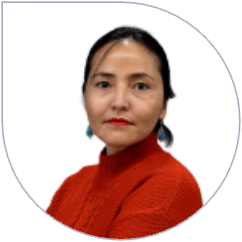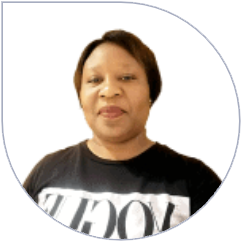International Women's Day 2024
IN THIS ISSUE
The Struggle Starts by Speaking Out
Giving voice and driving change takes sustained, collective effort.
 | Anthony Borden IWPR EXECUTIVE DIRECTOR |
The standardised game of football was invented in England, but from 1921-70, women were banned from Football Association (FA) grounds.
It took 103 years for the women’s game to recover. Currently, the Arsenal Women’s team sells out matches at the “men’s” stadium and is setting new attendance records– at long last, routinely exceeding the levels last seen a century ago.
This progress could only be achieved through collective effort – commitment from the players, fans, FA, media, business, schools, clubs and (in my own modest contribution) parents. Changing structures, changing minds, creating broad and sustainable social engagement. And lots of driving.
"The struggle is long and takes sustained, collective effort. Giving voice, driving change – as this collection of reports attest, it starts by speaking out."
The Women Journalists Defying the Taleban
Against all odds and despite constant danger, a brave few continue to report.
 | Zainab Pirzad MEDIA CONSULTANT |
Since the Taleban takeover of August 2021, conditions for Afghan girls and women have deteriorated dramatically. The authorities have imposed oppressive policies that curtail freedom of movement, expression and association.
More than 80 per cent of female journalists have lost their jobs, according to Reporters Without Borders. The few who remain must navigate intimidation and grave threats to their security to continue working.
The names and exact locations of the women profiled here have been changed to protect their identities.
“Everything has changed for women, they are no longer treated as human beings.”
“I Don’t Want to Live. I Want to Die”
Two decades of efforts to protect women and girls has been systematically dismantled.
Freshta Ghani, Mahtab Safi and Mahsa Elham ZAN TIMES JOURNALISTS
When Tahmina’s father realised the Taleban were on the verge of returning to power, he quickly married her off to a man whose family had ties to the militants. Aged 17, she moved into her husband’s family home in the Dand-e-Ghori district of Baghlan province, in the north of Afghanistan.
There, she was abused from the moment she stepped over the threshold. Her husband slapped, punched and beat her, often at the urging of her father-in-law. Her new family mocked, humiliated and abused her.
Life became even more unbearable when Tahmina’s husband was ambushed and killed by bandits. His father insisted that the young widow, then the mother of a two-month-old boy, marry her husband’s eight-year-old brother. When Tahmina refused, he killed her infant by cutting his throat.
“In the Taleban’s view, it is not necessary for women to go to court."
“I Have Learned to Never Give Up”
What helps me keep going is my belief in our mission to empower women journalists to report on what is happening under the Taleban.
 | Zahra Nader ZAN TIMES FOUNDER & EDITOR-IN-CHIEF |
I really miss Kabul. From Aref Shahid middle school to Iqra bookstore, from the Babur gardens to Razawi bakery and its Zaffron ice-creams - Kabul was the first city that I truly felt was mine.
I spent part of my childhood in Iran, where we fled the Taleban takeover when I was six years old. There, as an Afghan refugee I was subjected to racial slurs, cursed in the street, denied the right to education. I was humiliated and made to feel that I was unworthy of respect because of my country of origin. Some nights, I wished for a miracle that would turn me into an Iranian. But I learned miracles don't exist.
My life changed when I returned to Kabul in 2003. On the dusty streets of Kabul, I always held my head up with pride, for having a claim on the soil I was walking on. I was never afraid to speak up in Afghanistan, because this country belonged to me as much as it belonged to anyone else. It was in Afghanistan that I found my worth as a human being and learned to be an active player in the future I had imagined for myself and for my country. That gave me the confidence I needed to fight back.
“It was in Afghanistan that I found my worth as a human being.”
Ugandan Women Risk Their Lives to Access Abortion
“Many girls are dying because we have chosen to ignore them.”
 | Culton Scovia Nakamya JOURNALIST & MEDIA ENTREPRENEUR |
For Jovia (not her real name), 2023 was the worst year of her life. The 20-year-old business student was gang-raped at a drunken house party in the Kampala suburb of Kansanga and six weeks later realised that she was pregnant.
“I wondered what I am going to tell my parents. For God’s sake, I am just in my second semester of year one, and I didn’t know who did it,” she said.
Her options were limited, as abortion is illegal in Uganda except under rare circumstances. She confided in a female friend, who suggested they visit the Kampala suburb of Nakulabye, an area known as a hub of clinics that administer clandestine abortions, mostly to students.
“Society’s perceptions will not change now, but should women continue to die?”
Women in Central Asia Lead on Climate Change
Campaigners tackle widespread scepticism and lack of understanding of crisis.
Women have become leading lights in the field of environmental activism across Central Asia, despite facing public resistance and gender discrimination – and the fact that there are almost no women political decision-makers across the region.
"The health of women and children is the basis of the future of our society."
Defying Kompromat
“I couldn’t be bribed or stopped with death threats, but maybe I was supposed to be embarrassed enough by intimate pictures to be silenced.”
 | Emilia Sercan INVESTIGATIVE JOURNALIST |
I’ve been an investigative journalist for over 25 years, and since 2015 I have published over 100 articles exposing how senior Romanian officials in key institutions - politics, law enforcement, intelligence, military, the justice system - have plagiarised massive parts of their doctoral dissertations. I’ve also exposed how those plagiarists operate as a network, using their influence and power to legislate, regulate or investigate to cover their academic fraud.
"When these attempts to silence me failed, the harassment began."
“The Space for Abuse Seems Endless”
Gender disinformation aims to create a hostile environment for women with the goal of shaming, intimidating, silencing and excluding them.
Nadia Samet-Warren IWPR COUNTRY DIRECTOR
I am a woman of colour and a rights activist who has experienced every form of online abuse imaginable for over a decade. So let me tell you how this particular form of violence makes victims feel.
New Cyber Resilience Handbook for Women Rights Groups
Guide offers civil society groups practical resources to combat online threats.
A new IWPR handbook will support women’s rights activists, peacebuilders and advocates in Armenia, Moldova, and Georgia navigate the complex world of cybersecurity threats.
IWPR International Women's Day Journalist of the Year
Prize to honour contributors, beneficiaries and partners working in often challenging environments.
IWPR has launched an award for outstanding journalism to recognise the work of our network of women reporters worldwide.
Submissions for the inaugural IWPR International Women's Day Journalist of the Year have come in from contributors, beneficiaries and partners in countries including Ukraine, Venezuela, Iraq and Afghanistan.






